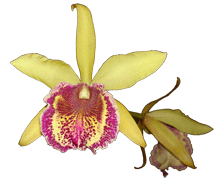Your First Orchid
If this is your first experience growing an orchid, don't be afraid of them, most are no more difficult to grow than ordinary houseplants. Orchids are unique, unusual, gorgeous, and very special. Since orchids are epiphites, or air plants, their culture requirements are different than other plants but once you get used to what they need we expect you will be delighted growing them.
Here are a few basic pointers for those just learning about orchids and their care.
Learn what kind of orchid you have so you can understand its needs. With over 800 genera, more than 25,000 species, and hundreds of thousands of registered hybrids, the orchid family is among the most diverse of the plant families. Don't let that be intimidating, there are only a dozen or so types of orchids that are generally seen for sale, a few more types if you go to an orchid show or nursery. Over half of the orchid plants that are produced are Phalaenopsis. Other genera such as Cattleya, Dendrobium, Cymbidium, Oncidium and Paphiopedilum are showing up in many places, including groceries and hardware stores. If your orchid doesn't have a label, you can try to identify it from pictures on our Orchid Finder page and from there learn its cuture and repotting needs.
Watering an orchid is different than it is for other plants. The easiest way to water an orchid is to take it to the kitchen sink once per week and flood it with water. The water will run right through the pot as orchids are potted in free-draining mixes. Walk away for a couple of minutes, come back and flood it again. A few minutes later put it back. Resist the temptation to water it too frequently, orchids hate that.
Fertilize "weakly, weekly". In nature most orchids cling to trees and get very little in the way of food. They are happiest with a consistent supply of weak fertilizer. In general orchids prefer a balanced complete fertilizer. Our Fertilizing FAQ offers help with specifics.
Repot orchids when they go out of bloom. This gives them the best chance at a successful growth phase and the flowering phase that follows. Orchids will smother if they remain in the same media too long, they are air plants and need oxygen at their roots. Usually repotting every 2 years is adequate though many will benefit from annual repotting.
More Information on:
- Orchid Care Basics
- Phalaenopsis
- Cattleya
- Orchid Repotting Clinic
- Orchid Growth Patterns
- Orchid Calendar










